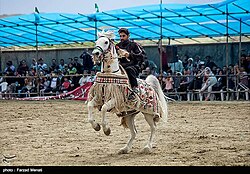 | |
| Distribution | All over Kurdistan, most commonly in Iranian Kurdistan |
|---|---|
| Traits | |
| Color | Various colors, including white, black, buckskin, brown, grey, and mixed. |
The Kurdish horse (Kurdish: ئەسپی کورد; Hespê Kurd; Persian: اسب کرد; Asb-e Kord) or the Kurd horse, is a horse breed of the Kurds. The horse is native to Greater Kurdistan. It is considered one of the main horse breeds native to Iran, alongside the Caspian, Turkoman, Assil (also known as Persian-Arab) and Dareshuri.
Characteristics
The Kurdish horse has three strains, the Afshari, the Sanjabi, and the Jaff. The Kurdish horse has a medium height (140 to 155 cm) and a compact, muscular body with sturdy bone structure. It has very thick skin and a dense coat as well as a thick mane and tail. As opposed to other native Iranian horse breeds such as the Turkoman, which have long backs and a skinnier length, the Kurdish horse has a stocky body structure. The Kurdish horse has large eyes that are deep in its socket, and for the most they are not prominent, although some strains of the breed have more prominent eyes. Its eyes are more oval-shaped. The Kurdish horse appears to have a shorter neck, although its neck is of an average height and appears short due to being wide, broad, and muscular. It has muscular shoulders, and a wide chest. It holds its neck in an upright position. The breed is known for having a high tail and head carriage. Its ears are set wide on the poll and are of medium length, however they may appear small due to their thick forelock. Their ears' auricles (pinna) are wide open. The Kurdish horse is an active and passionate breed.
History
The Kurdish horse is believed to be descended from an extinct population of horses named "Nesayee." As of 2022, the Kurdish horse population in Iran was estimated at 2,700 individuals. The horse was first bred in the province of Kermanshah (also known by Kurds as Kirmaşan), and later was brought to the Kurdish regions of Iraq, Turkey, and Syria. The horse was bred and used by Kurds for several millennia until today. The horse has an ability to survive in moderately-cold climates and mountainous regions, which have made it resistant to harsh environmental conditions.
In popular culture

During the 1991 Iraqi uprisings, the Peshmerga (when they were a rebel group rather than an official armed force) rode the Kurdish horses and used them to transport weapons thru the mountains. In 2019, Iran hosted the first National Kurdish Horse Beauty Festival in Ardebil province. A two-day festival dedicated to the breed was held in Kermanshah province in 2023. A festival was also held for it during 2023 in Sulaymaniyah. In May 2024, the third such festival was held to celebrate the breed.
Status
In January 2023, the Kurdish horse was added to the National Intangible Cultural Heritage list of Iran.
In December 2022, Iran announced they were developing a dossier for the horse for a possible inscription on the UNESCO World Heritage list. In November 2023, Iran and Iraq announced they were seeking a shared UNESCO status for the breed.
See also
References
- ^ "Sulaimani festival introduces Kurdish horses". www.rudaw.net. Retrieved 7 January 2024.
- Yousefi Mashouf, N.; Mehrabani Yeganeh, H.; Nejati Javaremi, A.; Maloufi, F. (2020). "A Novel Approach to Establish Breed Type and Standards for an Equine Breed: Persian Kurdish Horse" (PDF). Journal of Agricultural Science and Technology (Tarbiat Modares University Press). 22 (5): 1219–1233.
- Nazari, Faezeh; Seyedabadi, Hamid-Reza; Noshary, Alireza; Emamjomeh-Kashan, Nasser; Banabazi, Mohamad-Hosein (1 June 2022). "A Genome-Wide Scan for Signatures of Selection in Kurdish Horse Breed". Journal of Equine Veterinary Science. 113: 103916. doi:10.1016/j.jevs.2022.103916. ISSN 0737-0806. PMID 35218903. S2CID 247124515.
- ^ "Kurd horse gains national status". Tehran Times. 10 January 2023. Retrieved 6 January 2024.
- "Ardebil prov. to host Kurdish Horse Beauty Festival". Mehr News Agency. 9 June 2019. Retrieved 6 January 2024.
- "Kurd horses compete in a beauty pageant in Kermanshah". Tehran Times. 4 July 2023. Retrieved 6 January 2024.
- https://www.kurdistan24.net/en/story/34981-Third-Kurdish-horse-festival-featured-competitive,-strong-horses
- "Iran eyes UNESCO status for Persian, Kurdish horse". Tehran Times. 18 December 2022. Retrieved 6 January 2024.
- "Iran, Iraq seek shared UNESCO status for Kurd horse". Tehran Times. 18 November 2023. Retrieved 6 January 2024.